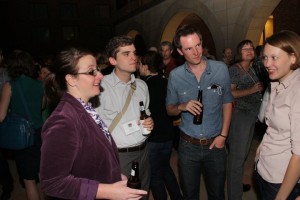Report From: Flow 2010 (#2)
Given that Erin so eloquently captured the buzz of the scholarly conversations this weekend and the freneticism of media scholars running between the AT+T conference center and various Tex-Mex restaurants, I’m going to focus on some of the roundtables that I found most intellectually stimulating.
Max Dawson’s roundtable “Putting the TV Back Into TV Studies” invited us to reconsider how we deal with media technologies. Daniel Chamberlain asked us to think more about the infrastructures and networks necessary for media transmission. All of the panelists raised issues faced by media researchers as we examine how sociohistorical contexts, industrial imperatives, and textuality interface with communication technologies that allow and disallow particular uses, viewing/listening experiences, and distribution policies. Together, the panelists asked us to consider how to take the structuring power of media technologies seriously without being labeled as technological determinists.
I found Jeff Scheible’s remarks on the “Left Behind” roundtable fascinating. Scheible’s exploration of where videotapes go when rental stores close their doors and his insistence that we understand “left behind” media in both spatial and temporal terms call attention to a focus on newness that may blind media scholars to the persistence of older forms of media experience. Daniel Kimball’s discussion of how old media influence new media policy via the case study of Internet radio policy illustrated the need to think about the regulatory power of media systems in decline. His point that Internet radio must fall below a “threshold of interactivity” in order to be called radio provided an ironic twist to the panel.
On my roundtable (“Managing Media Production in the Age of Convergence”), I was impressed by Erin Hill’s comments about the methodological issues she has encountered in chronicling low status “women’s” jobs in the studio system and the contemporary period. Micky Lee’s discussion of macro- and micro-level labor issues surrounding Google Books, Peter Alilunas’ exploration of the industrial history of the porn business, and Brett Boessen’s points regarding the messiness of the term “fan-made” and how we should teach our students to read producers’ social media posts in critical ways point to the continued importance of interrogating convergence and how we can use the signifier of convergence to historicize media production.
The participants on the roundtable “Tuning in to the Fine Print: Law and Social Change in Media” asked us to consider the policy positions taken by guilds and unions (Miranda Banks), possibilities for vernacular policy construction (Bill Kirkpatrick and Liz Ellcessor), the need to make policy arguments in economic terms (Lucas Logan), the need to consider industrial policy alongside legislation and judicial decisions (Carly Kocurek), and the need to historicize policies surrounding journalism (Jamie Lund).
Finally, the participants on the “‘Featuring Music From’: Song, Sound, and Remix” roundtable addressed how television and games offer “interesting provocations” for sound studies scholars (Lisa Coulthard), how the presence of radio in games structures the audiovisual experience of gameplay (Racquel Gonzales), how viral videos such as the “Bed Intruders” phenomenon invite both economic and political analysis (David Gurney), how the “allusive qualities” of popular songs are used in teen television (Faye Woods), how the changing role of the music supervisor asks us to write more histories of the recording industry (Kyle Barnett), how classic network system series used popular music (Lindsay Giggey), and how the Wu-Tang Clan’s body of work asks us to consider “polytextual clusters and mise-en-synergy” (Andrew deWaard).
It was a great weekend filled with robust conversations about the future of media studies, the sounds of the Texas “ya’ll,” and migas.




Hey Ben,
Thanks so much for the Flow conference report! Of course for many of us who don’t live in the American soil, it is a bummer to miss this engaging gathering of media scholars, so reading reports like you have is the closest we could get to attend the conference.
Anyway, was wondering if you know if there’s any recorded audio, transcript(s) or slides or whatever to the talks/roundtables conducted? I am interested especially in “Managing Media Production in the Age of Convergence” roundtable that you had. That would be very resourceful.
Thanx beforehand.
TV Enthusiast in the North of the Netherlands.